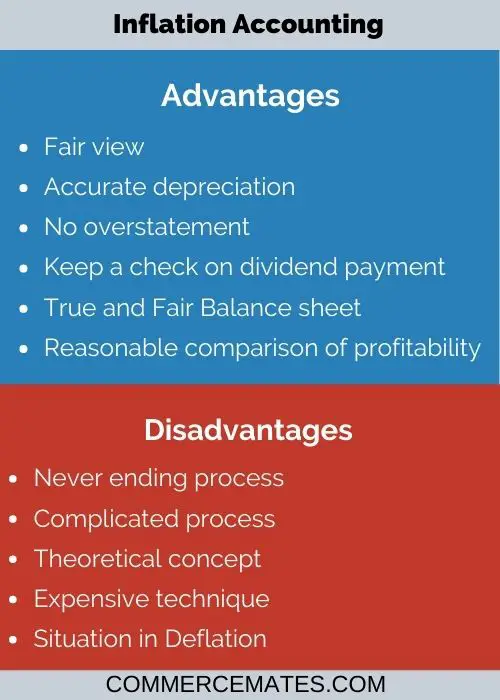Contents
What is Inflation Accounting?
Inflation accounting is a special branch of accounting which is used during inflationary periods for showing the accurate financial status of the company. It is an accounting process which adjusts the company’s financial statements with respect to the current price index for depicting a fair view of the business.
Inflation accounting is also termed as price level accounting. This branch of accounting helps in countering all issues arising from historical cost accounting in times of inflation and hyperinflation.
Inflation accounting records transaction of business at present value for analyzing the effect of price changes on cost, revenues, assets and liabilities of the organization. Current Cost accounting and Current purchase power method are two primary methods of inflation accounting.
Advantages of Inflation Accounting
Fair view
Inflation accounting enable firms to give a fair view of its financial position. It is a process where adjustments are made for matching current revenues with a current cost.
Accurate depreciation
It helps in calculating the right amount of deprecation by taking current value (inflated value) of the asset as the base for charging the depreciation and not its historical cost. Also, the accurate calculation of deprecation facilitates easy replacement of assets for firms.
No overstatement
Inflation accounting avoids any chance of overstatements of business income by financial statements. Under this accounting, all financial statements are adjusted as per the current price index for depicting a realistic position.
Keep a check on dividend payment
It assists the business in maintaining its real amount of capital by keeping an eye on dividend payments to its shareholders. It ensures that dividends and taxes are not paid on the basis of inflated profits in historical accounting but on the basis of current adjusted profits.
True and Fair Balance sheet
It enables company to present a fair view of its balance sheet by adjusting it with the effects of inflation. All assets are shown at a current values and not at distorted values as in historical accounting.
Reasonable comparison of profitability
Inflation accounting makes profit comparison of business reasonable by adjusting all its financial statements at current value. Profitability of 2 distinct plants purchased at different dates can be easily compared as it is calculated at present value and not on historical cost.

Disadvantages of Inflation Accounting
Never ending process
Major limitation with inflation accounting is that the price changing is a never ending process and continues for infinity. Adjusting of financial statement at every point of time whenever inflation or deflation occurs becomes a tedious task.
Complicated process
Inflation accounting is a very complicated technique as it involves a lots of adjustments to be done in financial statements. Too many calculations and unwanted adjustments are to be made which becomes a difficult task for a common man.
Theoretical concept
Inflation accounting is merely a theoretical concept as under it window dressing of accounting concepts is done as per the suitability of individuals.
Expensive technique
This accounting process is a very expensive technique. Small businesses cannot afford to implement it in their process.
Situation in Deflation
During deflationary periods, it may lead to an overstatement of business profits which is harmful. Prices fall suddenly at the times of deflation, making adjustments to the price level at this time will lead to lesser depreciation being charged by the company thereby causing an exaggeration of profits.